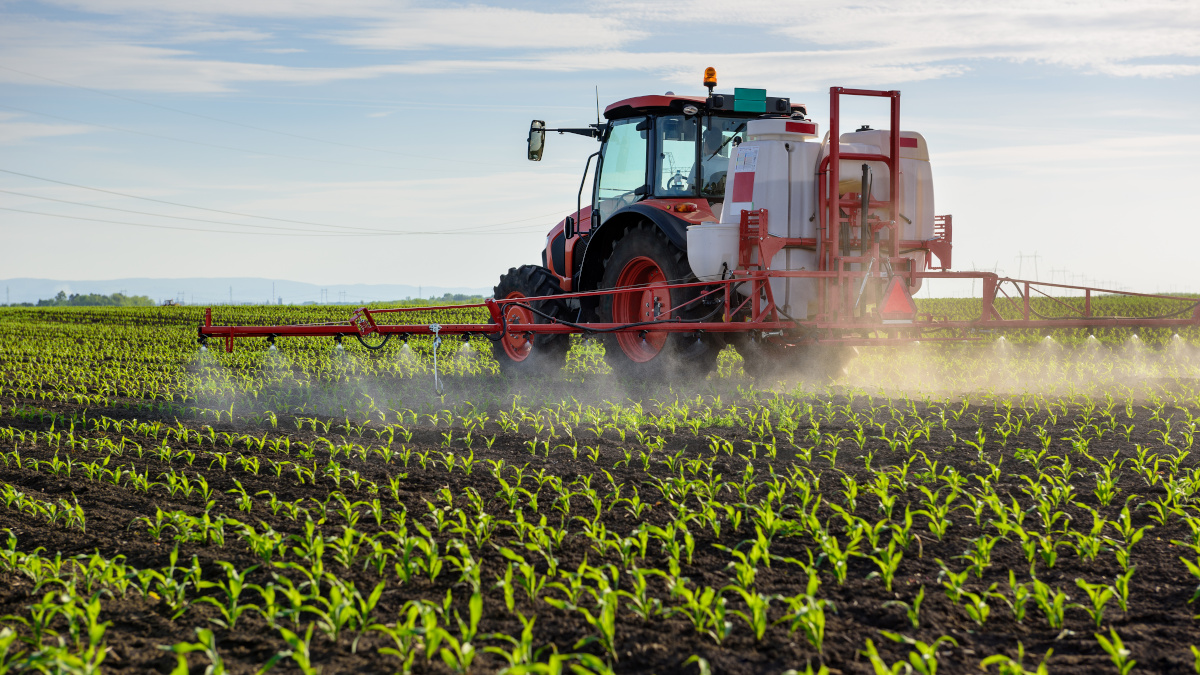Pesticides: what should we do about the contamination of our food?
Pesticides, the substances used for killing ‘harmful’ organisms, continue to contaminate our food. Discover how to deal with these toxic compounds on a day-to-day basis.

Impact of pesticides on our environment and health
The consequences of pesticide use are dramatic: each year, billions of euros are spent in Europe on making our increasingly contaminated water fit for drinking (1). Pesticides build up in the water table and disrupt every stage of the life cycle (2), significantly contributing to the sixth mass extinction currently affecting the planet. Our waterways still contain concentrations of atrazine, a molecule that has been banned since 2003, and it’s thought we’ll have to wait another 50 years before all traces of it have disappeared (3)...
Equally dramatic are the consequences for our health, which bears the full brunt of the effects of pesticide use. For some time, it was thought that chronic exposure to pesticides through the food we eat and the water we drink had no effect, but good sense has now prevailed.
No study has yet been able to categorically identify the impact of such long-term exposure on our health, still less the potential synergistic effects of all the pesticides to which we are exposed.
This is firstly because there is a long latency period between exposure to these substances and the onset of problems (4), as was the case with smoking and asbestos. Secondly, these studies are expensive to run and no company stands to profit from them. We are also seeing influencing strategies by agri-business lobbyists(5) which though nothing new, are unfortunately still effective …
We therefore have to rely on a multiplicity of shorter-term studies to try and predict the long-term effects. Indeed, it is this approach that has enabled the WHO’s International Agency for Research on Cancer - alerted by the growing number of health issues among farmers - to classify a number of herbicides and insecticides widely used in Europe and the US (6) as probable (group 2A) or possible carcinogens (group 2B).
How do pesticides affect our health?
Once in the body, pesticides appear to increase the production of reactive species (7) which are able to denature cell DNA, while impairing the antioxidant system that helps neutralize them (8). This imbalance is thought to be responsible for a multitude of health problems (9-13).
We should stress that these harmful effects are by no means limited to farmers! They also occur when pesticides are ingested via contaminated foods. Here again, several studies have shown that this is not a myth: in both Europe and the US, worrying levels of glyphosate and some of its metabolites have been found in the urine of individuals who do not as a rule handle this product (14). In comparing 1996 and 2016 levels of this pesticide, researchers observed an increase of around 1200% in 20 years, from 0.024 μg/L to 0.314 μg/L (15).
Animal studies have also shown that chronic exposure to very low levels of glyphosate can lead to significant liver damage (16). Little is known, however, about the effects of long-term skin exposure which primarily affects those who live close to spraying sites. But again, the story looks very similar to that of asbestos (17)…
Of course certain much-criticised pesticides may well be banned in the coming years (the use of glyphosate, for example, is being debated in Europe), but some could well be replaced by other products, the dangers of which will again have to be demonstrated …
Sadly, the typical path of a pesticide is a familiar one:
- product A is launched onto the market;
- it is subsequently suspected of being harmful to health;
- it accumulates in the soil, in waterways and in living organisms;
- decades pass before a sufficient number of studies sound the alarm;
- product A is given temporary authorisation before being gradually banned;
- it is then replaced by product B which in all likelihood, will follow a similar path.
What can be done to protect ourselves from pesticides?
All the evidence suggests we need to act quickly before an ecological or health crisis forces us to do so.
At a societal level, we urgently need to start making more principled choices. We too have the power to change things.If we choose to buy organically-grown products, it will persuade arable and livestock farmers to abandon a system that’s toxic and senseless, and instead switch to methods of production that are healthy and sustainable. And this is clearly the best way of minimising the amount of pesticides we ingest (even if some authorized pesticides are sometimes found in organic products – though at much lower levels).
At an individual level, we also need to adopt certain practices:
- soak fruit and vegetables in a mixture of vinegar and water before rinsing in cold water for several minutes to get rid of the compounds on their surface as much as possible;
- if you have a garden, vegetable patch or orchard, you can grow some of your food yourself;
- more generally, try to increase your consumption of fruit and vegetables (organic, of course) to help combat the oxidative stress produced by pesticides.
In vitro and in vivo studies have shown that antioxidant nutrients can help protect cells against damage caused by pesticide-induced reactive species. These nutrients provide genuine support when oxidative stress is abnormally high (18), which generally happens with chronic pesticide exposure (19), as well as in cases of constant stress, poor diet or insufficient sleep. We have selected several antioxidant supplements which have shown good results in studies looking specifically at environmental pollutant-related oxidative stress:
- curcumin (20) (taken orally for 60 days) ;
- vitamin E (21) (taken orally for 30 days) ;
- and vitamin C (22) (also taken orally for 30 days).
Each of these helps protect cells against oxidative stress. Some formulations such as AntiOxidant Synergy have been specially developed to combine excellent natural compounds that have antioxidant properties: curcumin, bilberry extract, grape seed extract, etc.
According to Paul Mills, a scientist investigating glyphosate levels in the body, “We are increasingly exposed to pesticides and most people do not even realise they are absorbing them in their food”. He can be reassured that our readers, at least, are now aware …
References
- Bommelaer Olivier, « Le coût des pollutions agricoles », Pour, 2012/1 (N° 213), p. 61-64. DOI : 10.3917/pour.213.0061.
- Schott Céline, Billen Gilles, « Agriculture et qualité des eaux dans le bassin de la Seine : une résistible dégradation ? », Pour, 2012/1 (N° 213), p. 45-52. DOI : 10.3917/pour.213.0045.
- Veillerette François, « Pesticides chimiques : quels enjeux pour la gestion de l'eau ? », Pour, 2012/1 (N° 213), p. 75-82. DOI : 10.3917/pour.213.0075.
- Dominique Desbois, « Exposition aux pesticides : de l’insuffisance des statistiques de santé publique aux promesses des applications mobiles de santé », Terminal [En ligne], 120 | 2017, mis en ligne le 17 mai 2017, consulté le 22 mai 2018. URL : http://journals.openedition.org/terminal/1657 ; DOI : 10.4000/terminal.1657
- Foucart, S. (2017). Ce que les « Monsanto Papers » révèlent du Roundup. Le Monde, 18 mars.
- Wells, P.G., McCallum, G.P., Chen, C.S., Henderson, J.T., Lee, C.J., Perstin, J., Preston, T.J., Wiley, M.J., and Wong, A.W. Oxidative stress in developmental origins of disease: teratogenesis, neurodevelopmental deficits, and cancer. Toxicol. Sci. 2009; 108: 14–18
- Ciftci O, Ozdemir I, Tanyildizi S, Yildiz S, Oguzturk H. Antioxidative effects of curcumin, β-myrcene and 1,8-cineole against 2,3,7,8-tetrachlorodibenzo-p-dioxin-induced oxidative stress in rats liver. Toxicology and Industrial Health. 2011;27(5):447–453.
- Al-Gubory, KH Environmental pollutants and lifestyle factors induce oxidative stress and poor prenatal development. Reproductive BioMedicine Online (2014).
- Agarwal, A., Aponte-Mellado, A., Premkumar, B.J., Shaman, A., and Gupta, S. The effects of oxidative stress on female reproduction: a review. Reprod. Biol. Endocrinol. 2012; 10: 49
- Al-Gubory, K.H. and Garrel, C. Antioxidative signalling pathways regulate the level of reactive oxygen species at the endometrial-extraembryonic membranes interface during early pregnancy. Int. J. Biochem. Cell Biol. 2012; 44: 1511–1518
- Bassil K.L., Vakil C., Sanborn M., Cole D.C., Kaur J.S., Kerr K.J., 2007. Cancer health effects of pesticides, Canadian Family Physician 53.10, p. 1704-1711.
- Mostafalou S., Abdollahi M., 2013. Pesticides and Human Chronic Diseases : Evidences, Mechanisms, and Perspectives. Toxicology and Applied Pharmacology 268.2, p. 157-177.
- Niemann L, Sieke C, Pfeil R, Solecki R. A critical review of glyphosate findings in human urine samples and comparison with the exposure of operators and consumers.J Fur Verbraucherschutz Leb. 2015;10:3-10. https://link.springer.com /article/10.1007/s00003-014-0927-3. Accessed September 13, 2017.
- Mills PJ, Kania-Korwel I et al. Excretion of the Herbicide Glyphosate in Older Adults Between 1993 and 2016, JAMA October 24/31, 2017 Volume 318, Number 16
- Mesnage R, Renney G, Séralini GE, Ward M, Antoniou MN. Multiomics reveal nonalcoholic fatty liver disease in rats following chronic exposure to an ultra-low dose of Roundup herbicide. Sci Rep. 2017;7:39328.
- « La stratégie criminelle des industriels de l’amiante », P. Herman et A. Thébaud-Mony, Le Monde diplomatique, juin 2000, pp. 20-21.
- Cutler RG, Mattson MP. Measuring oxidative stress and interpreting its relevance in humans. In: Cutler RG, Rodriguez H, editors. Oxidative Stress and Aging. River Edge, NJ, USA: World Scientific; 2003.
- Poljšak B., Fink R. The Protective Role of Antioxidants in the Defence against ROS/RNS-Mediated Environmental Pollution, Oxid Med Cell Longev. 2014; 2014: 671539.
- Ciftci O, Ozdemir I, Tanyildizi S, Yildiz S, Oguzturk H. Antioxidative effects of curcumin, β-myrcene and 1,8-cineole against 2,3,7,8-tetrachlorodibenzo-p-dioxin-induced oxidative stress in rats liver. Toxicology and Industrial Health. 2011;27(5):447–453.
- Murugesan P, Muthusamy T, Balasubramanian K, Arunakaran J. Studies on the protective role of vitamin C and E against polychlorinated biphenyl (Aroclor 1254)—induced oxidative damage in Leydig cells. Free Radical Research. 2005;39(11):1259–1272.
- Murugesan P, Muthusamy T, Balasubramanian K, Arunakaran J. Studies on the protective role of vitamin C and E against polychlorinated biphenyl (Aroclor 1254)—induced oxidative damage in Leydig cells. Free Radical Research. 2005;39(11):1259–1272.
Keywords
19 Hours
First bottle has been finished
First bottle has been finished. 2 bottles remaining for 3 month time frame trial as recommended
CORCORAN Pamela
5 Days
repeat customer
recommended by my doctor. easy to create an account. Discounts and specials are appreciated. packaging and delivery is dependable. Capsules easy to digest. I've had some some capsules and tablets that are broken inside their bottles.
Kokee
10 Days
Order was shipped on time and packaged…Wonderful Jobs!
Order was shipped on time and packaged excellently.
DMHoge
16 Days
great products and prices
great products and prices
Marie
22 Days
Easy to navigate site
Easy to navigate site, had what I was searching for, good price. easy order-check out
James Tucker
28 Days
My skin is clearing up nicely!
Pretty good for my skin so far.
Christian
30 Days
The new packaging is excellent
The new packaging is excellent - finally! No more squashed boxes and torn envelopes.
GORAN
31 Days
Great Product
Great Product
Larry Garrett
35 Days
Quick shipping
Quick shipping; good price. No issues!
Mary McCarty
37 Days
Thr product is very good and is helping…
Thr product is very good and is helping me on my health. Then is always on time
LUGO Luz
39 Days
Buying was fine
Buying was fine. I had problems with the website not recognizing my login info, and had to call to get it fixed. Other than that, everything was good.
David S. Clark
40 Days
Your super maca and super ginseng are…phenomenal
Your super maca and super ginseng are phenomenal supplements that compliment each other when taking them together. Fantastic feeling of well-being and lots of mid day energy without the crash.
Keith Mason
42 Days
I have had amazing results with every…
I have had amazing results with every supplement I've purchased. I am extremely satisfied with this company
kirstin Torres
42 Days
Fine products
Fine products . They are on the leading edge of online supplements. The only issue -so far-is they sometime run out of subscription items.
Jason Argos
45 Days
The ordering process is very user…
The ordering process is very user friendly and the products always come in a timely manner.
CARTER Rhonda




